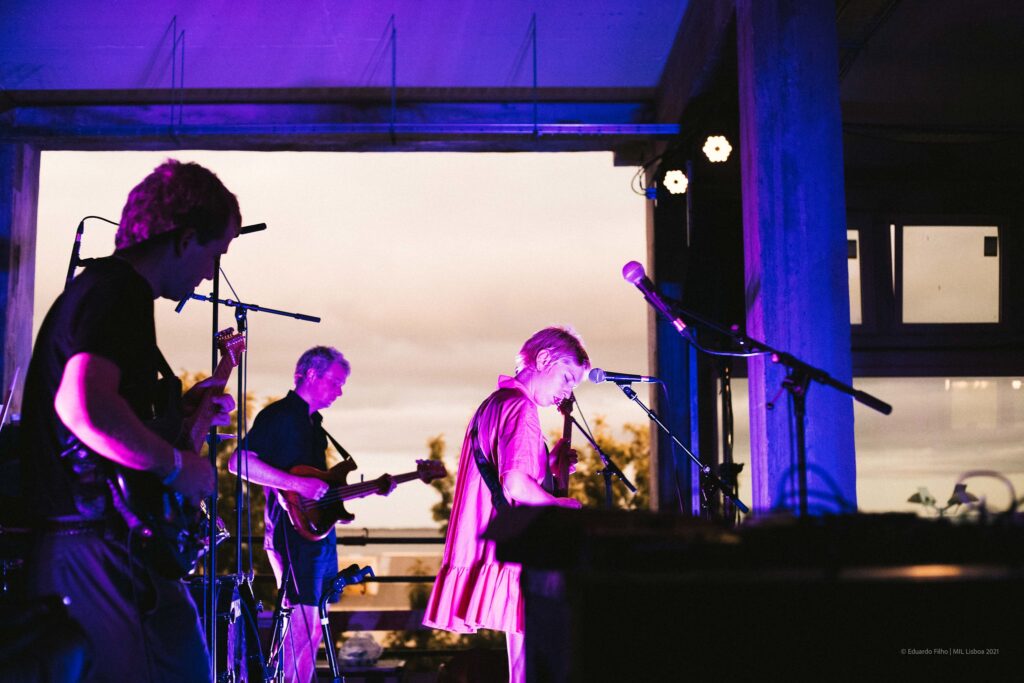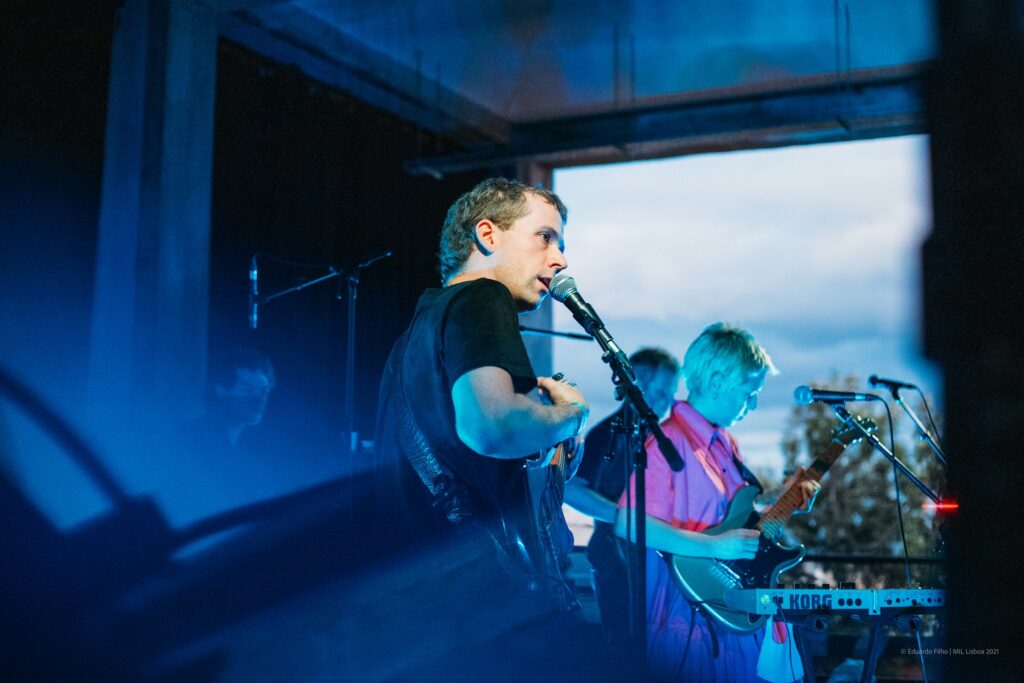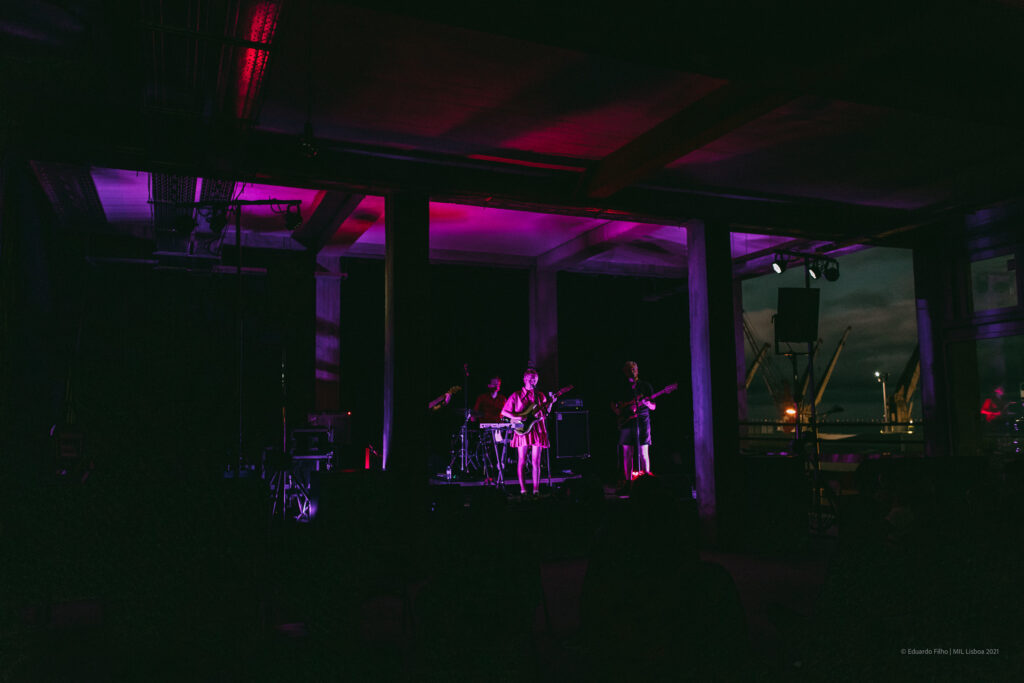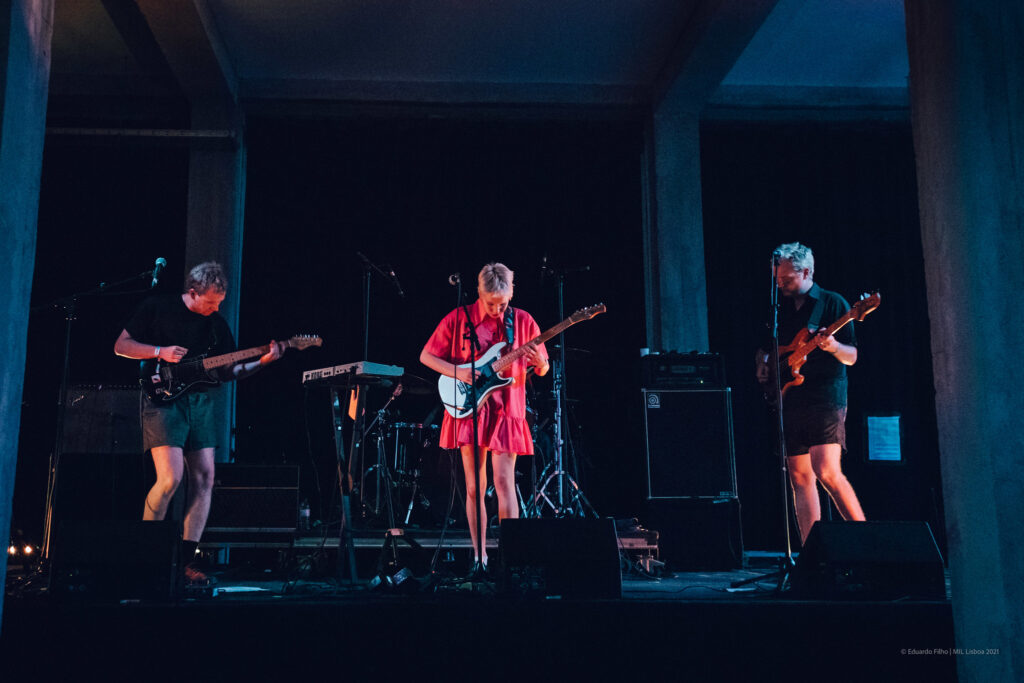
Click here for the english version.
LIVEUROPE FORA DE CONTEXTO #8
A banalidade e niilismo do quotidiano num mundo à beira do precipício são vertidos em som nas canções dos neerlandeses Global Charming, que atuam num registo de pós-punk descolado que não resiste a lembrar os pioneiros que lhes precederam. A sua abordagem ao género, no entanto, não é meramente nostálgica: o aconchego à melodia e à vontade com métricas irregulares aponta para um grupo bem mais maduro do que os seus riffs desajeitados e postura descomprometida poderão, à partida, sugerir. Se o foco na questão das alterações climáticas não for suficiente, uma volta pelo recantos de Mediocre, Brutal (2020), o disco de estreia, chegará para convencer de que não falamos de mais uma banda punk.

Q&A com Sara Elzinga & Jilles van Kleef dos Global Charming
Em jeito de apresentação para os que ainda não vos conhecem: que cenário melhor descreveria a vossa música?
SE: Sons descontruídos de guitarra e baixo, depois o Sjoerd faz o seu *imitação de som de bateria* e tu cantas. É assim que eu descreveria a nossa música.
JK: Diria que o nosso ponto de partida é clássico do rock n’ roll com a guitarra, baixo, bateria e voz mas estamos sempre à procura de algum espaço vazio entre as notas… Tentamos encontrar um equilíbrio entre manter as coisas minimalistas mas ao mesmo tempo…
SE: Certeiras.
E se a vossa música fosse um lugar, qual seria?
SE: Frio.
JV: Questão difícil. Definitivamente um espaço interior.
SE: Acho que o espaço onde tocámos no MIL…
JV: Sim! Era meio inacabado e essa é uma ideia com o qual nos identificamos muito, de as coisas estarem meio inacabadas, meio a trabalhar. Ou a trabalhar mas…
SE: Com algumas dificuldades.

Como é que a mediocridade do quotidiano e a nossa submissão ao capitalismo se tornou tema central nas vossas canções?
SE: É só porque somos todos um bocado mal-humorados.
JK: Somos mal-humorados no que diz respeito à vida. Não foi uma decisão real, mas trata-se algo que todos sentimos e é algo que mexe connosco de uma forma estranha. Não somos capazes de ignorar estas coisas e a forma de lidar com elas é enfatizando-as, acho eu.
Pergunta tipo ovo ou galinha: Os Global Charming surgiram como um quarteto de pós-punk como um resultado dessa necessidade de expor as maleitas do capitalismo ou foi ao contrário? Como é que surgiram enquanto banda e como é que vossa identidade sonora ganhou forma?
JK: Para mim, fazer música alternativa ou pós-punk é, de certa forma, anti-capitalista porque tu sabes que não vais fazer dinheiro com isso, por isso, escolher passar muito tempo a fazê-la é optar automaticamente por uma vida fora… Bem, não fora do capitalismo, mas como vais dedicar muito tempo a isto e não fazer dinheiro torna-se inerentemente anti-capitalista. Mas diria que a razão pela qual começamos a fazer música foi por nos sentirmos insatisfeitos com muitas outras coisas na vida…
SE: E com a cena musical holandesa em geral.
JK: Por isso, procuramos criar um espaço para podermos fazer coisas que nos trouxessem algum tipo de satisfação.
SE: E não foi como se nos tivéssemos juntado e dito: “vamos começar a fazer pós-punk”. Simplesmente começamos a fazer música e foi nisso que se tornou.
JK: O ponto de partida foi muito aberto e pensamos simplesmente: queremos fazer música com pessoas de quem gostamos e seguimos com o que quer que seja que nos faça felizes. Foi isto que se tornou. Nunca houve um plano, só algumas ideias, mas nós estávamos dispostos a deixar tudo para trás e fazer nova música. Só queríamos mesmo fazer algo que trouxesse alguma felicidade.
Começar uma banda independente e tentar fazer vida disso é sempre difícil mas lançar um primeiro álbum no meio de uma pandemia adiciona a camada de complexidade certa. Como é que foi apresentarem-se ao mundo com um álbum que não puderam tocar?
SE: Podíamos acabar por ter de esperar mais cinco anos, por isso não queríamos adiar mais a data de lançamento, só queríamos mesmo fazê-lo.
JK: Vimos muitos artistas que decidiram adiar o lançamento e esperar por uma altura melhor.
SE: E continuaram simplesmente a adiar tudo. E nós vimos que as coisas não iam mudar cedo.
JK: Sim, e é preciso tanto tempo para fazer um álbum e acabar as canções, gravar, misturar e masterizar tudo. E agora é ainda pior com os tempos de espera dos vinis, por isso demora tanto tempo a fazer um álbum que assim que terminas só queres despachar tudo e, de certa forma, avançar e dar continuidade ao processo criativo.
SE: E na altura em que lançamos o álbum já estávamos a tocar estas músicas há 2 anos, por isso precisávamos de avançar.
JK: Mas tem sido muito estranho não tocar muito após o lançamento. Felizmente, tivemos algumas oportunidades, como no MIL e outros sítios, mas tem sido estranho porque antes da pandemia tocávamos muito na verdade. Talvez ao nível de marketing faria as coisas de forma diferente, mas só queríamos mesmo lançar o álbum.
Têm alguma letra de que se sintam especialmente orgulhosos? Qual e porquê?
JK: Tenho sempre curiosidade em saber o que os outros membros da banda pensam das letras. Qual é a tua letra preferida?
SE: Eu gosto da maioria das letras, caso contrário eu diria que não. Agora está a dar-me um branca, mas estou a tentar pensar numa letra. Talvez um verso da ‘Celebration’ ou ‘No Compromise’?
JK: Engraçado. Pessoalmente, eu gosto mesmo da letra da Soft Fruit. Há uma espécie de pré-refrão quando um sintetizador surge com um verso que diz: I eat the fruit that has gone soft in their angry hands. Acho que essa é a minha preferida.
SE: Eu também gosto de: “Everybody dies twice / Two birds, one stone / Sometimes”. Gosto especialmente do “Sometimes”. E “I’m thinking of incompentece”, porque penso em incompetência várias vezes.
Em Setembro, tocaram no festival MIL aqui em Lisboa. Para muitos, foi sem dúvida o melhor concerto do festival. Como é que foi para vocês tocarem aqui?
SE: Foi muito bom. Encontramos vários amigos no festival, por isso não nos sentimos nada estranho, foi muito confortável. E gostei muito da localização.
JK: E como tu nunca sabes bem o que esperar especialmente quando vais assim para longe, foi incrível ver o espaço em que estávamos a tocar, todo em betão e meio inacabado e quando estávamos a tocar começou a anoitecer por isso de repente estava muito escuro e foi muito divertido tocar.
SE: Sonoramente, a sala era extrema o que fez o concerto todo ser também ele extremo. E embora a plateia estivesse sentada, dava para ver que estavam entusiasmados e isso foi bom.
_ Texto por Pedro Miranda / Fotografias de Eduardo Filho / Entrevista por Musicbox
LIVEUROPE FORA DE CONTEXTO + aqui
Sob a premissa de um continente europeu sem fronteiras, o Liveurope vem unir o Musicbox a vinte outras salas europeias, de Oslo a Barcelona à Tessalónica, no propósito comum de promover os EENNA (Emerging European Non-National Artists), músicos europeus estreantes vindos de países diferentes dos das salas que os acolhem, criando uma rede pan-europeia de difusão das novas frequências continentais. Ainda que a pandemia tenha interrompido a atividade destas salas, o Musicbox não quis que o distanciamento social causasse um curto-circuito a esta conexão entre artistas e público. Colmata-o, agora, com este catálogo de promessas da música europeia que deveriam ter passado pelo seu palco, e têm a vinda adiada ao regresso à normalidade.
ARTISTAS
ENGLISH VERSION
The day-to-day banality and nihilism in a world at the edge of the cliff are spilled into sound in Global Charming’s songs, who perform in a detached post-punk setting that makes it impossible not to mention the pioneers that came before them. However, their approach to the genre is not merely nostalgic: the comfort found with melody and with irregular metrics points to a group way more mature than what their clumsy riffs and nonchalant posture might at first suggest. If the focus on climate change is not enough, a trip around the corners of Mediocre, Brutal (2020), their debut album, will be enough to convince us that we are not speaking of just another punk band.

Q&A with Sara Elzinga & Jilles van Kleef from Global Charming
To kind of present yourselves to those who don’t know you: paint a scenery that would best describe your music.
SE: Deconstructed sounds from guitar and bass and then Sjoerd does his little *imitates drum sounds* and then you sing. That’s how I would describe it.
JK: Our starting point is really kind of like classic rock n’ roll so it’s guitars, bass, drums and then singing but I think we’re always looking for some kind of empty space between notes… We try to get a like a certain balance to keep things minimalistic but at the same time…
SE: To the point.
If your music were to exist in a specific place, what would it be?
SE: Cold.
JV: Difficult question. Definitely inside, I think.
SE: I think the location where we played on MIL…
JV: Yes! It was half-finished and that’s a theme that resonates with us, this idea of things being like half-finished, half-working, or working but…
SE: Struggling.

How did the mediocrity of our daily lives and our surrender to capitalism become a central topic in your songs?
SE: That’s just because we are all a bit grumpy.
JK: We’re grumpy about life. It wasn’t like a real decision, but it was more just something we were all facing and that’s kind of what resonates with all of us in a weird way. We are not really able to ignore these things and the way to deal with them is to put more emphasis on them, I guess.
Chicken or the egg question: Did Global Charming come up as a post-punk quartet a result of that need to just expose how capitalism has been destroying us or it was the other way around? Ho did Global Charming was formed and how did your soundscape gain form?
JK: To me, making alternative or post-punk is, in a way, anti-capitalist because you know you are not going to make any money with it so choosing to spend a lot of time doing it is kind of automatically signing up for a life outside… Well, not outside of capitalism but you know you’re not gonna make a lot of money out of it and you put a lot of time in it so it becomes kind of inherently anti-capitalist. But I think the reason we started making music was because we were very dissatisfied with a lot of other stuff in life…
SE: And with the music scene in general in the Netherlands.
JK: So I guess we just tried to create a space for ourselves to do things that would bring some kind of satisfaction.
SE: It’s not that we came together and said “oh, we’re gonna start to make post-punk now”. We just started making music and that’s what it became.
JK: The starting point was very open and we just thought: ok we want to make music with some people that we like and we are gonna continue with whatever we’re happy with. That’s what it became. There was never really a plan, there were some small ideas but we would throw everything away and make new stuff. We really wanted to do something that would bring us some joy.
Starting an independent band and trying to make a living out of it is always difficult. Releasing the first album in the middle of a pandemic adds just the right layer of complexity. How it was to present yourselves to the world with a record you were not able to play?
SE: We could be waiting for like five more years so we don’t want to push back the date, we just wanted to do it.
JK: We saw a lot of artists who wanted to postpone the release and wait for a better time.
SE: And they kept postponing it. And we all saw that it wasn’t going to change very soon.
JK: Yeah, and it takes such a long time to make an album, to finish all the songs, record, mix, master everything. Now, it’s even worse with vinyl waiting times. It takes so long to make an album that by the time you are finished you just kind of want to get it over with and, in a way, move on, keep the creative process rolling.
SE: By the time we released we were already playing those songs for two years, so we needed to move on.
JK: But it’s been weird to just not play a lot after the release but luckily we’ve had some chances on MIL and some other stuff, which was nice but it’s been strange because before the pandemic we played quite a lot actually. It felt really weird to finally release an album and not be able to play it but… I guess marketing-wise or whatever you’d probably do it differently but we just wanted to release it.
Do you have a lyric that you are especially proud of? What would that be and why?
JK: I’m always curious about what the other bands members think of the lyrics… What’s your favorite lyric?
SE: I like most of the lyrics otherwise I would have said so. I’m blackout, but I’m trying to think of one. Either a line of Celebration or No Compromise?
JK: Funny. Personally, I really like the lyrics from ‘Soft Fruit’ and there’s like a pre-chorus when the synthesizer comes in and I’ve got this one line that says: ‘I eat the fruit that has gone soft in their angry hands’. I think that’s my favourite one.
SE: I also like ‘Everybody dies twice / Two birds, one stone / Sometimes’. I’m especially fond of ‘Sometimes‘. and ‘I’m thinking of incompetence‘ because I am thinking of incompetence quite sometimes.
Last September you played at MIL festival, which is our venue’s festival. For many, it was without a doubt the best show of the festival. How did it feel for you to play here?
SE: It was really nice. There were a lot of friends of ours at the festival, so we didn’t feel strange at all, it was really comfortable. And also I really liked the location.
JK: Since you never really know what to expect especially when you’re going away like this, it was really nice to see the building we playing, all in concrete and half-finished, and when we were playing it started getting darker so all of a sudden it was just really dark. It was a really fun show to play.
SE: Sound-wise, the room was quite extreme which made the whole show feel more extreme. And even though the audience was seated, you could see that they were enthusiastic so that was nice.
_ Words by Pedro Miranda / Photos by Eduardo Filho / Interview by Musicbox
OUT OF CONTEXT LIVEUROPE + here
Under the premise of a European continent without borders, Liveurope brings together Musicbox and other twenty European music venues from Oslo to Barcelona to Thessaloniki with the common purpose of promoting EENNAs (Emerging European Non-National Artists), European musicians who are just starting and come from different countries than those of the venues receiving them, creating a pan-European network that diffuses the new continental frequencies. And even though the pandemic has interrupted the venues’ work, Musicbox didn’t want social distancing causing a shorting in this connection between artists and audiences. It tackles it, right now, with this catalog of the European music promises that should have played on its stage and saw their coming postponed to when life gets back to normal.






